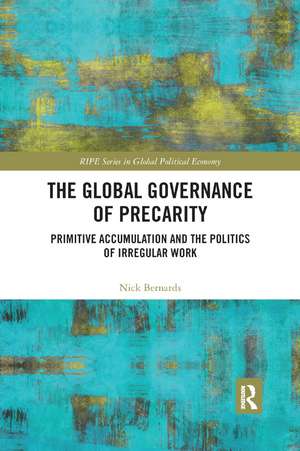The Global Governance of Precarity: Primitive Accumulation and the Politics of Irregular Work: RIPE Series in Global Political Economy
Autor Nick Bernardsen Limba Engleză Paperback – 12 dec 2019
This book argues that standard employment relations have always co-existed with a plethora of different labour regimes. Highlighting the importance of the governance of irregular forms of labour the author draws together empirical, historical analyses of International Labour Organisation (ILO) policy towards forced labour, unemployment, and social protection for informal workers in sub-Saharan Africa. Archival research, extensive documentary research and interviews with key ILO staff are utilised to explore the critical role the organization’s activities have often played in the development of mechanisms for governing irregular labour.
Addressing the increasingly widespread and pressing practical debates about the politics of precarious labour in the world economy this book speaks to key debates in several disciplines, especially IPE, global governance, and labour studies. It will also be of interest to scholars working in development studies and critical political economy.
| Toate formatele și edițiile | Preț | Express |
|---|---|---|
| Paperback (1) | 271.61 lei 6-8 săpt. | |
| Taylor & Francis – 12 dec 2019 | 271.61 lei 6-8 săpt. | |
| Hardback (1) | 818.67 lei 6-8 săpt. | |
| Taylor & Francis – 13 feb 2018 | 818.67 lei 6-8 săpt. |
Din seria RIPE Series in Global Political Economy
-
 Preț: 310.75 lei
Preț: 310.75 lei -
 Preț: 280.02 lei
Preț: 280.02 lei -
 Preț: 281.27 lei
Preț: 281.27 lei -
 Preț: 310.01 lei
Preț: 310.01 lei -
 Preț: 390.12 lei
Preț: 390.12 lei -
 Preț: 288.80 lei
Preț: 288.80 lei - 26%
 Preț: 820.21 lei
Preț: 820.21 lei - 18%
 Preț: 700.75 lei
Preț: 700.75 lei -
 Preț: 386.55 lei
Preț: 386.55 lei -
 Preț: 470.90 lei
Preț: 470.90 lei - 18%
 Preț: 999.46 lei
Preț: 999.46 lei - 18%
 Preț: 1054.97 lei
Preț: 1054.97 lei - 18%
 Preț: 1057.40 lei
Preț: 1057.40 lei - 18%
 Preț: 1055.60 lei
Preț: 1055.60 lei - 18%
 Preț: 1053.16 lei
Preț: 1053.16 lei -
 Preț: 362.26 lei
Preț: 362.26 lei -
 Preț: 456.16 lei
Preț: 456.16 lei - 18%
 Preț: 1058.79 lei
Preț: 1058.79 lei - 18%
 Preț: 1057.89 lei
Preț: 1057.89 lei - 26%
 Preț: 822.54 lei
Preț: 822.54 lei -
 Preț: 278.75 lei
Preț: 278.75 lei - 18%
 Preț: 1056.47 lei
Preț: 1056.47 lei - 18%
 Preț: 1057.89 lei
Preț: 1057.89 lei - 18%
 Preț: 1054.89 lei
Preț: 1054.89 lei -
 Preț: 453.96 lei
Preț: 453.96 lei -
 Preț: 411.42 lei
Preț: 411.42 lei -
 Preț: 428.67 lei
Preț: 428.67 lei - 26%
 Preț: 821.53 lei
Preț: 821.53 lei -
 Preț: 487.86 lei
Preț: 487.86 lei -
 Preț: 353.94 lei
Preț: 353.94 lei - 26%
 Preț: 846.78 lei
Preț: 846.78 lei - 31%
 Preț: 766.24 lei
Preț: 766.24 lei - 18%
 Preț: 1058.43 lei
Preț: 1058.43 lei - 15%
 Preț: 427.78 lei
Preț: 427.78 lei - 18%
 Preț: 696.82 lei
Preț: 696.82 lei -
 Preț: 385.44 lei
Preț: 385.44 lei - 18%
 Preț: 700.31 lei
Preț: 700.31 lei - 18%
 Preț: 1004.20 lei
Preț: 1004.20 lei -
 Preț: 465.69 lei
Preț: 465.69 lei - 15%
 Preț: 672.40 lei
Preț: 672.40 lei - 18%
 Preț: 1016.52 lei
Preț: 1016.52 lei - 18%
 Preț: 1115.21 lei
Preț: 1115.21 lei -
 Preț: 485.07 lei
Preț: 485.07 lei
Preț: 271.61 lei
Preț vechi: 326.04 lei
-17% Nou
Puncte Express: 407
Preț estimativ în valută:
51.97€ • 54.26$ • 43.01£
51.97€ • 54.26$ • 43.01£
Carte tipărită la comandă
Livrare economică 05-19 aprilie
Preluare comenzi: 021 569.72.76
Specificații
ISBN-13: 9780367891176
ISBN-10: 0367891174
Pagini: 176
Dimensiuni: 156 x 234 x 16 mm
Greutate: 0.41 kg
Ediția:1
Editura: Taylor & Francis
Colecția Routledge
Seria RIPE Series in Global Political Economy
Locul publicării:Oxford, United Kingdom
ISBN-10: 0367891174
Pagini: 176
Dimensiuni: 156 x 234 x 16 mm
Greutate: 0.41 kg
Ediția:1
Editura: Taylor & Francis
Colecția Routledge
Seria RIPE Series in Global Political Economy
Locul publicării:Oxford, United Kingdom
Public țintă
PostgraduateCuprins
Introduction Chapter 1: Irregular Labour in Global Capitalism Chapter 2: The Governance of Forced Labour and the Antinomies of Colonialism Chapter 3: Urbanization, Colonial Crisis, and Social Policy Chapter 4: Irregular Work in the Postcolonial Social Order: The ILO Discovers the ‘Informal’ Chapter 5: Neoliberal Crises and the Politics of Informality Chapter 6: Reviving the Governance of Forced Labour: ‘Traditional Slavery’ and Child Trafficking in West Africa Conclusion
Notă biografică
Nick Bernards is Assistant Professor of Global Sustainable Development at the University of Warwick
Recenzii
"In this extremely well researched book Nick Bernards takes aim at, and dispatches, various theories of precarious and forced labour. His critique of the ILO’s role in generating a mythical ideology of properly functioning contract-based labour markets is excellent. This book represents an important academic and political intervention into debates around, and campaigns against, diverse forms of labour exploitation." - Benjamin Selwyn, University of Sussex, UK
"This is a timely book as the International Labour Organization (ILO) approaches its first century. It shows through meticulous scholarship the ILO’s efforts to regulate forced labour, labour migration and informal labour in sub-saharan Africa. It is the missing story of labours’ marginalised . It is is a must read for students of International Political Economy (IPE) , labour and development studies." - Edward Webster, University of Witwatersrand, South Africa
"This is a timely book as the International Labour Organization (ILO) approaches its first century. It shows through meticulous scholarship the ILO’s efforts to regulate forced labour, labour migration and informal labour in sub-saharan Africa. It is the missing story of labours’ marginalised . It is is a must read for students of International Political Economy (IPE) , labour and development studies." - Edward Webster, University of Witwatersrand, South Africa
Descriere
This book argues that standard employment relations have always co-existed with a plethora of different labour regimes and highlights the importance of the governance of irregular forms of labour.
